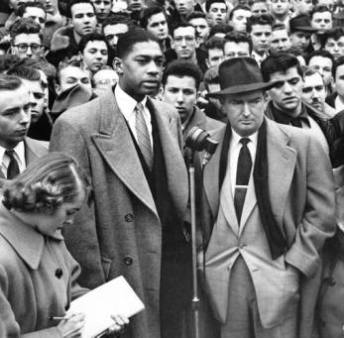It’s not easy to do the right thing when everybody’s making money but you. That’s why ’50s Manhattan College basketball star Junius Kellogg stood out in more ways than one.

In the superb 1998 HBO documentary, City Dump: The Story of the 1951 Basketball Scandal, broadcaster Al McGuire remembers, “You didn’t even have $15 for laundry in those days. You had no scratch, no green. When you have no green, green talks, and green talks loud!”
The City College of New York (CCNY) scandal was to college basketball what the Black Sox scandal was to baseball. It’s a morality tale of what can happen when success gets out of hand; when big-time college sports meets big-time gambling. Five New York City boys were not only great athletes but represented the American hardscrabble minority Jewish and black players. To thousands of New Yorkers and broadcaster Marty Glickman these guys “were your sons, your buddies. They were us.”
During the 1950 season the CCNY Beavers whipped Adolph Rupp’s Championship Kentucky Wildcats. Rupp, notorious for his anti-Semitic, anti-black sentiments, endured an 89 to 50 defeat at the hands of the “sons of immigrants and the grandsons of slaves,” as writer Stanley Cohen recalls. In ’50 and ’51, CCNY was the first and only team to win both the National Invitation Tournament (NIT) and NCAA championship titles in the same season.
Then the unthinkable happened. When it was discovered that the dream team of college basketball had taken money for “missed opportunities” and “stupid mistakes,” the city of New York and college basketball was forever changed.
However, we all share a level of responsibility for scandals like this. When we allow sports to serve a “show-me-the-money” mentality we rationalize away our highest aspirations. Instead of fostering character, we justify a win-at-any-cost philosophy. Rather than promote honest sportsmanship, we rationalize corruption with the pressure athletes’ face. We then give many of them reduced fines or short sentences followed by a media platform to hear their excuses or promote their books.
But we can and should do better.
Instead of rationalizing pressure, we need to strengthen our moral resolve. Rather than justify, we need to teach that excellence is not just about a well-executed “pick-and-roll,” it’s about becoming an honorable person off the court, as well. It’s about striving to live up to a set of standards that we know is right even when the consequences of doing so will cost us more than we really want to pay.
Junius Kellogg understood this when he took the courageous step and provided evidence to his coach and authorities that he had been offered $1,000 to shave points. His reporting led to the arrest and conviction of several gamblers.
But that was just the opening chapter in the story of this man.
After serving in the Army, Kellogg returned to Manhattan College and graduated in 1953. He went on to play for the Harlem Globetrotters. After an auto accident left him paralyzed in 1954, Kellogg went on to champion wheelchair athletics and became Head Coach of the USA Stoke Mandeville Games as well as Head Coach for the 1964 U.S. Paralympics’ Basketball Team. In 1981, Kellogg was inducted into the National Wheelchair Basketball Association’s Hall of Fame.
Today’s athletes may be stronger, faster, and quicker than anything anyone has ever seen, but many of them lack one critical ingredient; one thing many coaches have forgotten to include in all the high-tech training. Another hero of the ‘50s had it up to the day he died.
At the 75th anniversary dinner for Time magazine, Kevin Costner toasted Joe DiMaggio, “not just for how well he played the game, but for how he played. Not just for how he stood but for what he stood for.”
Junius Kellogg stood for integrity.
Comments










